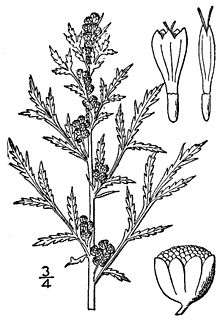Artemisia biennis
Artemisia biennis is a species of sagebrush known by the common name biennial wormwood.[2] It is a common and widely distributed weed, so well established in many places that its region of origin is difficult to ascertain. One source (Flora of North America) maintains that the species is most likely native to northwestern North America and naturalized in Europe, New Zealand, and eastern and southern North America.[3][4]
| Artemisia biennis | |
|---|---|
 | |
| 1913 illustration[1] | |
| Scientific classification | |
| Kingdom: | Plantae |
| Clade: | Tracheophytes |
| Clade: | Angiosperms |
| Clade: | Eudicots |
| Clade: | Asterids |
| Order: | Asterales |
| Family: | Asteraceae |
| Genus: | Artemisia |
| Species: | A. biennis |
| Binomial name | |
| Artemisia biennis Willd. 1794 | |
| Synonyms | |
|
Synonymy
| |
Description
This is an annual or biennial herb producing a single erect green to reddish stem up to 2 metres (6 ft 7 in) in maximum height. It is generally hairless and unscented. The frilly leaves are up to 13 centimetres (5.1 in) long and divided into thin, lance-shaped segments with long teeth. The inflorescence is a dense rod of clusters of flower heads interspersed with leaves. The fruit is a tiny achene less than a millimeter wide.[3]
Invasive species
It is an invasive species and noxious weed in many places. It is a weed of several agricultural crops, particularly soybeans, other types of dry edible beans, and sunflowers.[5]
References
- illustration from Britton, N.L., and A. Brown. 1913. An illustrated flora of the northern United States, Canada and the British Possessions. Vol. 3: 526.
- "Artemisia biennis". Natural Resources Conservation Service PLANTS Database. USDA. Retrieved 6 July 2016.
- Flora of North America Vol. 19, 20 and 21 Page 523 Biennial wormwood, armoise bisannuelle Artemisia biennis Willdenow, Phytographia. 11. 1794.
- Biota of North America Program 2014 county distribution map
- Kegode, G., et al. (2007). Biology and Management of Biennial Wormwood. The Glyphosate, Weeds, and Crops Series. NDSU Extension Service.